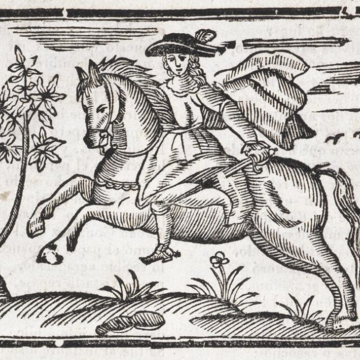Spanish Street Literature: Chapbooks, Broadsides and Digital Access
Applications are invited for a doctoral studentship (CDA) on Spanish street literature as part of the Open-Oxford-Cambridge AHRC Doctoral Training Partnership (DTP). This collaborative studentship is attached to the Faculty of History, University of Oxford, in partnership with Cambridge University Library.

Woodcut of Sebastiana del Castillo, 18th century, chapbook published by Laborda of Valencia, collection of Cambridge University Library
This fully funded position is available from October 2025. Further details about the value of an Open-Oxford-Cambridge AHRC DTP award are available on the DTP’s studentships page.
Closing date: 7th January 2025 (midday UK time).
Project Overview
This studentship is an opportunity to work with the substantial collection of Spanish eighteenth- and nineteenth-century street literature held by Cambridge University Library (CUL). The collection is made up of chapbooks (pliegos sueltos), broadsides (aleluyas) and popular play texts (comedias). A large proportion of this collection has been digitized and can be consulted here; however, other elements are only partially catalogued. CUL is working with institutions in Spain and the UK on the ‘Mapping Pliegos’ project to make visible these fascinating sources.
Chapbooks and broadsides catered to a growing market for popular reading (and hearing) matter, both in urban and rural areas. While they were aimed at poorer social groups, they also found an audience among the richer strata of Iberian society. Usually in verse and illustrated, chapbooks and broadsides cover an enormous range of themes including saints’ legends, heresies, miracles, murders, brigands, executions, horror stories, family dramas, love affairs, wars, political events, slavery, humour, magic, education, the agricultural year, sport, recipes, health, childhood and just about every topic one can imagine. Some of the narratives are specific to the Iberian world, others, such as stories of Charlemagne and his paladins, circulated widely in Europe and beyond, both in print and in oral tradition. Despite these continuities, street literature was often ephemeral, and changed rapidly. Narratives were reshaped as they shifted from one medium to another, as they moved geographically, as they were diffused among different audiences, as well as over time.
A student could explore any of these popular cultural themes, and use them to chart wider social change. An example of what can be done with Spanish street literature is provided by the AHRC funded project Wrongdoing in Spain, 1800-1936: Realities, Representations, Reactions (2011-14), led by emeritus Professor Alison Sinclair.
An alternative or parallel use of the studentship would be to concentrate on the material itself. Who printed chapbooks and broadsides, where and when? How did they reach their market? How were they consumed? Who collected them and why? Digital humanities tools might help explore the corpus in new ways, for example by finding reliable dating evidence, or by mapping the diffusion of different titles. The student may wish to incorporate a distinct element of digital humanities into their research proposal.
The student is also expected to help make the CUL collection more ‘discoverable’, through the cataloguing of the collection and/or adding metadata for the chapbooks that have already been digitized. The student will also help in the promotion of the collection and their own research, through blog posts and public events.
Supervision
The lead academic supervisor is David Hopkin, Professor of European Social History at the University of Oxford, an expert on oral traditions and popular culture. The student will be a registered doctoral student of Oxford’s History Faculty and will be able to participate in all the research activities and other opportunities provided for postgraduates within the Faculty, the Oxford Humanities Division and the wider University.
The CUL supervisor is Sonia Morcillo-Garcia, the Hispanic Specialist at Cambridge University Library. CUL will provide training in cataloguing and the description of digital materials. The student will work alongside colleagues in the Cambridge Digital Humanities Centre, CUL’s Digital Content Unit and the new University Library Research Institute (ULRI) which brings together scholars engaged with collections-based research.
How to Apply
We invite applications from candidates from all backgrounds and ethnicities. Applicants should have good Spanish reading knowledge and already have, or currently be studying for, a Master's degree in an appropriate subject relative to this collection and its research potential (such as history, Iberian languages and literature, art history, history of the book, digital humanities, folklore and ethnology).
Applicants should meet the eligibility criteria for Open-Oxford-Cambridge DTP studentships.
Should you have any questions, or would like an information discussion about how you might approach the CDA project, you are welcome to contact Professor David Hopkin at david.hopkin@history.ox.ac.uk and Sonia Morcillo-Garcia at sm252@cam.ac.uk
You should apply to the DPhil in History by 7th January 2025 (midday, UK time) indicate your interest in being considered for an Open-Oxford-Cambridge AHRC DTP studentship and submit a completed copy of the OOC DTP application form at the same time.


